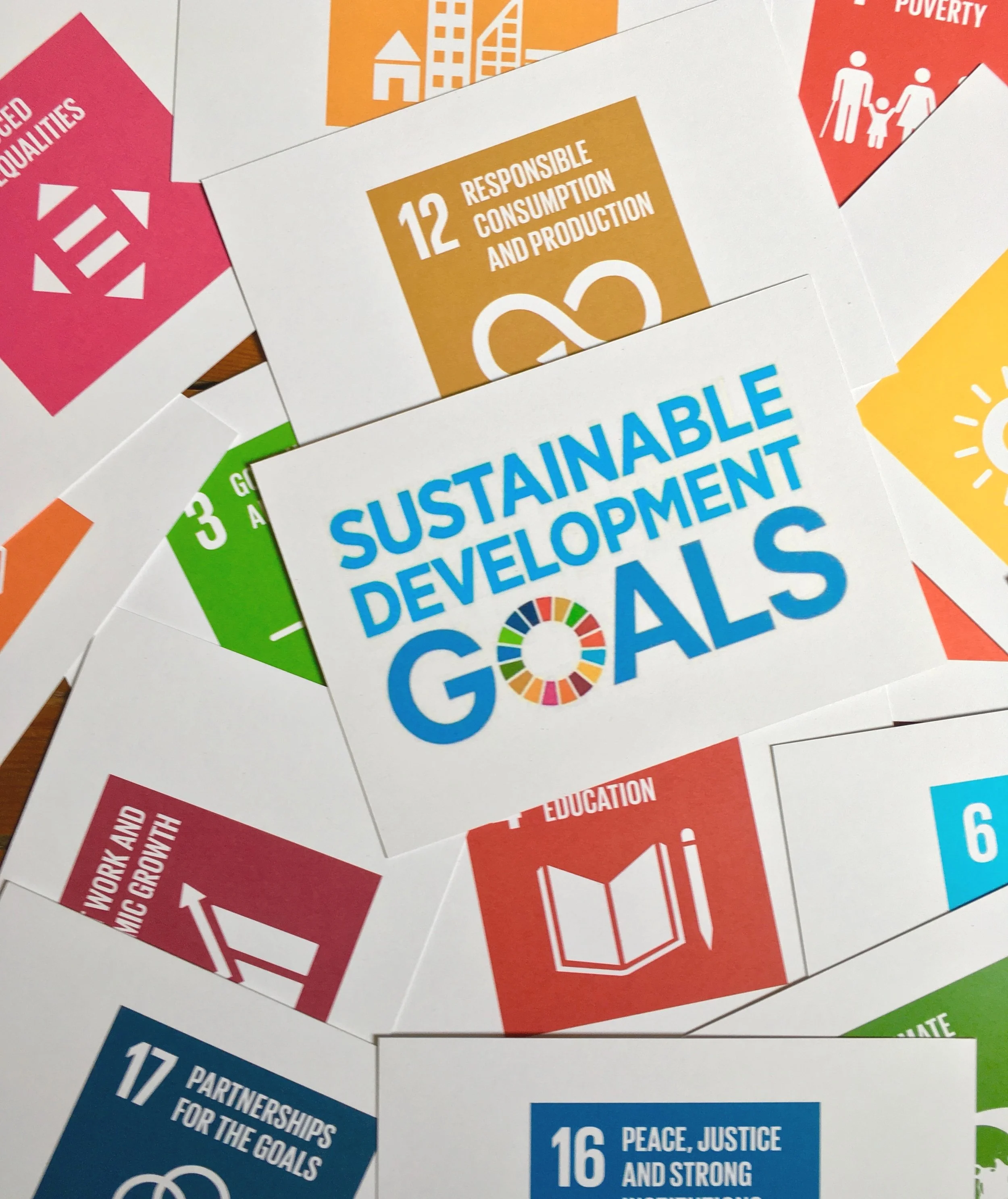When we get caught up in enthusiastic attention being paid to an issue – like single-use plastic or palm oil – it can knock our planned approach off-course. Or we can use it as an entry point for some strategic thinking. If you get the opportunity to strategise with senior leaders, what are the tools to help you?
If you want to do a more rigorous analysis of your sustainability impacts and opportunities, people I interviewed for Change Management for Sustainable Development recommended a range of frameworks and tools. Here they are, so you can use them too.
Everyday eco-living in Japan
The loo with an integrated handbasin which drains into the cistern; the fifty-page guide to recycling and rubbish disposal; the tiny boxes you can put your leftover food into at a café; the handbag size hand towel you take with you to use in public loos… I saw a lot of things in Japan which we could usefully adopt in the UK.
How can business contribute to the Sustainable Development Goals?
Businesses - acting alone or, better still, collaborating - can do so much to help society meet the Sustainable Development Goals (or Global Goals).
Whether it’s reducing emissions from travel and energy use, making sure women and minority groups are able to progress, or cutting unnecessary plastic, there is so much to put right. And there are organisations, tools and initiatives to help you.
Find out more in the series of articles I wrote for The Environmentalist. A complete set is available in pdf here.
Surfing a wave of change - #OurBluePlanet
Peace, justice, partnerships and a strategic approach - 7/7 on business and the Sustainable Development Goals
Work, growth, innovation and equality - Sustainable Development Goals and business
Stonewall and P&G's work to promote equality for LGBT staff in Spain, Rype Office's repurposed office furniture for Public Health Wales, Willmott Dixon Interiors working with the Amber Foundation to help vulnerable youngsters into work... These are just some of the businesses featured in part six of my seven part series for The Environmentalist on how business can help support the SDGs.
Clean energy, thriving cities: Sustainable Development Goals #5
Bringing affordable off-grid renewables to remote communities in developing countries; using cutting-edge data analysis to save money and carbon in modern buildings; micro-managing students' energy use to balance the national grid: some of the brilliant things that are featured in the latest of my series on how businesses are helping contribute to meeting the Sustainable Development Goals.
Sweet like chocolate - protecting Earth's life support systems
In the fourth of my series on business and the Sustainable Development Goals, I found out about how Nestle and Mondelez are working to secure their long-term supply of cocoa, about how companies are calling for greater action on carbon emissions and how the pension fund of England's environment regulator is divesting from fossil fuels. This part of the series looks at Goal 13 Climate Action and Goal 15 Life on Land.
You can see the article over at The Environmentalist's website here. Login if you are a subscriber or an IEMA member, or register for a free trial. If that's not for you, the pdf is here.
Explorer Inge Solheim raised a flag representing Goal 13, Climate Action, in the community closest to the North Pole, to support the UN Global Goals for Sustainable Development. Image c/o Global Goals media centre.
Fresh water, salty water and sustainable resource use - business and the Sustainable Development Goals #3
Free diving world champion Umberto Pelizzari, raised a flag to represent Goal 14, Life Below Water, off the coast of Formentera, to support the UN Global Goals for Sustainable Development. Credit: Enric Sala. http://www.globalgoals.org/media-centre/
In the third of my series on what business can do to support the Sustainable Development Goals, published in The Environmentalist, I look at goals 6 clean water and sanitation; 14 life below water and 12 responsible consumption and production.
I found lots of interesting action - most of which predates the SDGs - and was able to squeeze in impressive strides in reducing water use by Levi Strauss, Maersk Group starting to shift the entire ship breaking sector through its work in India and some head-to-head competition between Tesco and Sainsbury's on reducing food waste. And much more...
You can read the article in its rightful home on The Environmentalist's site here, or if you're not an IEMA member or a subscriber you can download a pdf here.
A global purpose: the Sustainable Development Goals and business #2
Business can help society meet the Sustainable Development Goals (aka Global Goals). Find out more about work on hunger, health and quality education.
Thanks to the lovely people at IEMA's The Environmentalist magazine, for the invitation to write this series on business response to the SDGs. It's given me a reason to talk to lots of people doing important work inside lots of businesses and NGOs.
The second article is now out (May 2016), and it covers goals 2, 3 and 4:
You can access the article, and plenty of other environmental news, here, either sign in with your IEMA login, subscribe or take a free trial.
Alternatively, there's a pdf of it here. The first article in the series, giving an introduction to the SDGs and looking at Goal 1 (poverty) and Goal 5 (Gender) is here.
Has there been a tipping point for sustainable business?
Sustainability types were discussing the Sustainable Development Goals (aka Global Goals) in London last night, at a regular meeting of The Crowd. If you are twitter-enabled, you can search for the #crowdforum tweets to follow that way.
I've got very interested in the SDGs, since being asked to write a series of articles about how business is responding, for The Environmentalist.
There was some great conversation, and I was particularly struck by Claire Melamed's view that businesses can cherry pick (or have strategic priorities) among the SDGs, as long as a business doesn't actively undermine any of the goals or targets. That seems a pretty clear minimum ask!
How would you tell if a goal is being actively undermined?
So how would you tell? Perhaps the easiest is to do an audit-style check against all 169 of the targets, and spot the krill oil which is staining the otherwise spotless business practices. Some will be easier to test than others, so the views of stakeholders will probably be useful in helping see the business's practices from a variety of angles.
What are the sanctions and disincentives?
The people who spoke about this seemed to be relying on good old fashioned campaigns to bring the undermining to public attention and turn it into a business issue for the company concerned. Which seems pretty familiar to me. One person used the Greenpeace campaign against the use of unsustainable palm oil by Nestle's Kit Kat as an example. And that campaign was way back in 2010. Friends of the Earth was launched in the UK with a mass bottle dump outside Schweppes headquarters, which became a well-known photo at the time. Social media ensures that campaigns like this can become viral in a few hours. But in essence they are nothing new.
Another person said "you'd have to be not in your right mind, to actively undermine any of these goals." And perhaps she's right. But it's clear that either lots of people haven't been in their right minds, or perhaps it's been perfectly rational to undermine social and ecological life support systems, because we are here and here isn't a great place for many of the critical issues highlighted by the global goals. Once again I find myself wobbling between irrational optimism and chronic unease.
But let's give this optimist the benefit of the doubt, and assume that it is now rational to avoid actively undermining the goals.
What's changed?
The claim was made, with some strength of feeling, that COP21's agreement in Paris has made a tangible difference, with analysts using climate and fossil fuel exposure to make investment recommendations. And there seemed to be general agreement in the room that this was new and significant. And today, two days after the Crowd forum event, comes the news that Peabody Energy (the world's biggest privately-owned coal producer) has filed for bankruptcy. So that's one of the 17 goals accounted for.
Other voices suggested that the 17 goals will set a broad context for action by policy makers and government, helping business decision-makers have more certainty about what the future holds and therefore being more confident to invest in goal-friendly products, services and ways of doing business. On the other hand, people noticed the apparent disconnect between the UK Government's pledges in Paris, and its action to undermine renewables and energy efficiency, and support fossil fuel extraction, in the subsequent budget and policy decisions.
Another change was the rise of the millenials, who make up increasing proportions of the workforce, electorate and buying public. Their commitment to values was seen as a reason for optimism, although there was also a recognition that we can't wait for them to clear up our mess. (As someone who still clears up her own millenial children's mess, while said young people are jetting off and buying fast fashion off the interwebs, I am perhaps a little cynical about how values translate into action for this generation.)
And the final bid for what's changed, is the recognition and willingness of players to collaborate in order to create system-level change. And the good news on this is that there is a lot of practical understanding being shared about how to make collaboration work (Working Collaboratively is just one contribution to this), and specialist organisations to help.
So has there been a tipping point?
Lots of people were insisting to me that there has. There were few negative voices. In fact, some contributors said they were bored and in danger of falling asleep, such was the level of agreement in the room. I was left with the impression that we're getting close to a critical mass of business leaders wanting to do the right thing, and they need support and pressure from the rest of us to make it in their short-term interests to do so.
So is it back to the placards, or sticking with the post-it notes?
Sustainable Development Goals - what do they mean for your business?
In September 2015, the United Nations agreed a set of 17 Sustainable Development Goals. Covering everything from gender equality to the ecology of the deep oceans, they form a comprehensive description of the key challenges we face in making sustainable development a reality.
The UN sees businesses as a key player in meeting the goals. Why should business bother? And where do you start?
I'm writing a series of articles for The Environmentalist exploring these questions, and the first one is out today (11th February). It introduces the goals, and looks in detail at Goal 1 End poverty in all its forms everywhere and Goal 5 Achieve gender equality and empower all women and girls.
You can access the article, and plenty of other environmental news, here, either sign in with your IEMA login, subscribe or take a free trial.
Alternatively, there's a pdf of it here.








